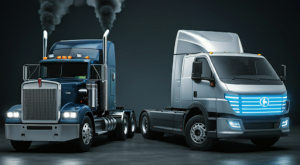
The transportation industry is undergoing a significant transformation, with electric vehicles (EVs) emerging as a viable alternative to traditional internal combustion engine (ICE) trucks. As the demand for sustainable and efficient transportation solutions grows, it’s crucial to understand the key differences between ICE and electric trucks.
Internal Combustion Engine (ICE) Trucks
ICE trucks have been the mainstay of the transportation industry for decades. They rely on fossil fuels like diesel or gasoline to power their engines.
Pros:
- Established Infrastructure: ICE trucks benefit from a well-established network of fueling stations and repair facilities.
- Longer Range: ICE trucks generally have a longer range compared to current electric truck technology.
- Payload Capacity: Many ICE trucks can handle heavy payloads, making them suitable for various applications.
Cons:
- Environmental Impact: ICE trucks contribute to air pollution, greenhouse gas emissions, and noise pollution.
- Rising Fuel Costs: The cost of fossil fuels is constantly fluctuating and can significantly impact operational expenses.
- Maintenance Costs: ICE trucks require regular maintenance, including oil changes, engine repairs, and emissions checks, which can add to operational costs.
Electric Trucks
Electric trucks are powered by batteries, which store energy that is used to propel the vehicle.
Pros:
- Zero Emissions: Electric trucks produce no tailpipe emissions, making them a cleaner option for the environment.
- Lower Operating Costs: Electricity is generally cheaper than fossil fuels, leading to lower operating costs over time.
- Reduced Maintenance: Electric trucks have fewer moving parts, resulting in lower maintenance costs compared to ICE trucks.
- Instant Torque: Electric motors provide instant torque, resulting in better acceleration and performance.
Cons:
- Limited Range: Current electric truck technology often has a shorter range compared to ICE trucks, limiting their suitability for long-haul transportation.
- Charging Infrastructure: The development of charging infrastructure for electric trucks is still in its early stages, which can limit their usability in certain regions.
- Higher Purchase Price: Electric trucks generally have a higher upfront cost compared to ICE trucks.
Choosing the Right Truck for Your Needs
The decision between an ICE truck and an electric truck depends on various factors, including your specific needs, budget, and environmental goals. If you prioritize fuel efficiency, reduced emissions, and lower operating costs, an electric truck might be a suitable option. However, if you require a longer range and have access to a robust charging infrastructure, an ICE truck may be more practical.
Roadwe: Managing Your Trucking Business Efficiently
Regardless of whether you choose an ICE or electric truck, efficient fleet management is essential for maximizing profitability. A digital platform like Roadwe can help you streamline your operations by managing bilties, invoices, tracking your fleet, and more.
So, what are you waiting for? Sign up today to get started.
